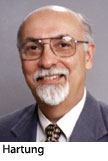Readers of this column continue to respond in unusually large numbers to topics stimulated by the wife of a pastor who wrote about personal concerns of her spirit.
Feeling a lack of fulfillment in maintaining her own health and vitality, she wondered a bout seeking spiritual care — including worship — outside her husband’s rural parish.
bout seeking spiritual care — including worship — outside her husband’s rural parish.
In December, “Pressure Points” first surfaced her situation and provided a platform for my initial response. The January column included some readers’ comments, including a number who found my first response lacking.
I am still getting reader response to this topic — just days before this March Reporter goes to press. This is clearly an important conversation and concern.
While this public conversation comes to something of an end with this “Pressure Points,” I do plan to respond privately to each reader’s comments on the topic. Many of them include stories that are poignant or offer creative and wise suggestions. Again, my thanks to every one of you who has written to me concerning this.
Looking at the larger scope of what this situation means, I am more than ever convinced that it is vital for the voices of those who struggle or hurt to be heard — clearly, empathically, and helpfully.
We do not do anyone in the community of believers in Christ any good by telling her to suppress her needs. In my judgment, it also is not in the Spirit of Christ to ignore or criticize a hurting person. As one reader wrote: “It is my experience that humanity is often too quick to offer a ‘fix’ or [be so] offended by what we are hearing that we miss the root issue — a person’s pain.”
Instead, what if part of the task of the Christian community gathered around Word and Sacrament were to help all members of that community have a safe enough sacred space to tell their stories, share their pain and difficulties, and rejoice in the blessings of life in Christ? In other words, what if our communities were indeed places where the full range of life’s experiences could be brought to the cross?
Hearing concerns of others does not necessarily mean that all their concerns will be met. But it does mean that members of the community can mobilize to be as helpful, resourceful, and encouraging as possible.
Among recent specific suggestions that readers have offered to the hurting pastor’s wife are the following:
- Several writers recommended that she seek out local, regional, or national/international Lutheran Women’s Missionary League (LWML) groups or gatherings, using them both for spiritual growth and for developing leadership skills and opportunities.
- “Our solution — get out of the parsonage on Sunday afternoon. We are gone, sometimes just the two of us with our children at a sitter, sometimes as a family. And when time allows, we worship together as a family at a neighboring Lutheran church that has services other than [on] Sunday.”
- “Become involved in some activities that she finds fulfilling … whether it be in community activities or church activities in the larger community that are not available in her small town.”
- “People can only sacrifice their well-being for so long before they cease to be effective in their calling and burn out.” Suggestions: connecting to a spiritual advisor/director (not her husband), counselor, or wise spiritual mentor.
And finally, I think that one wife of a pastor offered a fitting summary when she wrote: “The spiritual care and nurture of the wives of pastors of our church body is a huge issue that just isn’t dealt with, not because the pastors … and leaders don’t care. They just don’t understand the magnitude of it. They also don’t understand what a tremendous blessing to the church we can be when we are spiritually and emotionally healthy. … When pastors’ wives are given the support they need, they are in a better position to support their pastor husbands, and their husbands can in turn better minister to their congregations.”
Right on!
Rev. Bruce M. Hartung, Ph.D., is associate professor of practical theology at Concordia Seminary, St. Louis. He can be reached at hartungb@csl.edu.
Posted Feb. 24, 2006



